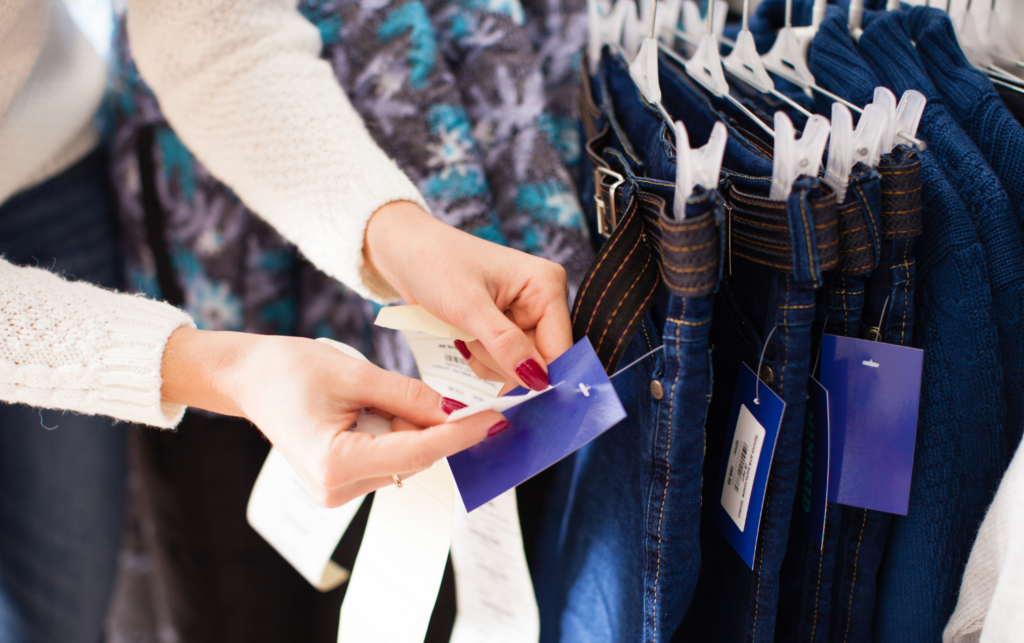Sustainability Certifications in the Textile Industry
by ajones | Mar 31, 2021 | Blog, Sustainability | No Comments

Public awareness surrounding traceability and transparency has, of course, increased the demand for textile certifications. Sustainability certifications support textiles throughout the supply chain, therefore tracing from the cultivation of fibers to a retail-ready product. They test products to determine whether textiles are produced ethically and responsibly. There are a number of certifications available for textiles–some of which test for environmentally destructive processing methods, hazardous chemicals, and complex social compliance issues, such as child labor, workers’ wages/benefits, and labor conditions.
Textile certifications are important because they provide a benchmark for brands and retailers to achieve sustainable levels of production. Many brands are partnering with OEKO-TEX®, bluesign®, and others during production, adding these certification marks on to their packaging and hangtags so that customers know, at first glance, that they are purchasing safe, high-quality products.
Though there are many, this article discusses a few of the most well-known sustainability certifications for textiles.
OEKO-TEX®
Firstly, OEKO-TEX® works with 16,000 manufacturers, brands, and retailers in nearly 100 countries to verify that their products are free from harmful chemicals (OEKO-TEX, 2020). The organization, made of 18 separate institutes in Europe and Japan, develops testing and encourages innovation to create high-quality textile and leather products. Certainly such certifications empower consumers to make responsible purchase decisions by supporting products that prioritize safety for the user and the environment.
OEKO-TEX® offers several certification options, which include, in short: STANDARD 100, LEATHER STANDARD, MADE IN GREEN, STeP, DETOX TO ZERO, and ECO PASSPORT. Of course each certification verifies product safety differently. However, labeled products have been tested and certified to be free of hazardous substances. A few popular certifications for textiles include the following:
STANDARD 100 by OEKO-TEX®
This certification guarantees that every part of the article, down to thread and buttons, is tested to make sure products are safe for consumer use. It notably reviews various regulated and non-regulated substances and often goes beyond national and international requirements to ensure all processing chemicals are non-toxic.
MADE IN GREEN by OEKO-TEX®
This certification provides a traceable product label for a number of end use textile products. Along with providing assurance that the product has been tested for harmful substances, the label also verifies that the textile was manufactured using sustainable processes and under socially responsible conditions for workers.
ECO PASSPORT by OEKO-TEX®
Finally, this certification is for chemicals, colorants, and auxiliaries used in the textile and leather industries. The process analyzes whether or not each ingredient in the product meets the statutory requirements and is not harmful to human health.
bluesign®
Secondly, bluesign® focuses on three areas: people, environment, and resources. The bluesign® system supports chemical suppliers, textile and trim manufacturers, and brands through the entire supply chain. The system provides factories and mills with tools to promote, adopt, and implement safe chemicals usage. Bluesign® also develops systems to decrease water and energy usage, reduce wastewater, and eradicate hazardous substances.
Overall, the bluesign® system optimizes sustainability by reviewing processes and product components step by step. Only companies that have committed to the bluesign® system can claim this certification by using at least 90% bluesign®-approved textiles and 30% bluesign®-approved accessories.
Global Organic Textile Standard (GOTS)
Next, Global Organic Textile Standard, otherwise known as GOTS, is a worldwide leader in textile processing standards for organic fibers. The GOTS certification helps brands and consumers ensure that organic fibers are sourced ethically, sustainably, and responsibly, all the way from field to fashion. In 2020 alone, the number of GOTS-certified facilities rose 34% globally to a high of 10,388 (Friedman, 2021).
Other sustainability certifications
Finally, other sustainability certifications include the Sustainable Apparel Coalition and the Textile Exchange:
The Sustainable Apparel Coalition leads the fashion and textile industries’ alliance for sustainable production by developing the Higg Index. To clarify, the Higg Index is a suite of tools that help brands, retailers, and facilities to transparently measure the sustainability performance of their company or product and see where they can improve (Chua, 2020). Once products are assessed, brands and retailers can become verified based on their Higg Index scores.
The Textile Exchange is a global non-profit of over 500 members that builds community and develops leaders in the preferred fiber and materials industry. They share research findings, offer certifications (such as the Organic Content Standard and Recycled Claim Standard), lead the drive to reduce carbon dioxide emissions from textile fiber and material production by 45% by 2030, and share Sustainable Development Goals and resources to help the industry thrive.
Why certifications matter
In conclusion, sustainability certifications support the fashion industry’s global initiative to improve manufacturing processing methods, which opens the door for more sustainably produced products that are safe to consumers. As more products are marked as certified, consumers will become more educated and will make responsible purchasing decisions.
References
Bluesign. (2021). The blue way. https://www.bluesign.com/en
Chua, J. M. (2020, August 17). Report: Higg Index, without transparency and incentives, is a ‘scale without a diet’. Sourcing Journal. https://sourcingjournal.com/topics/sustainability/higg-index-fem-uc-berkeley-sustainabilty-226459/
Friedman, A. (2021, February 26). GOTS certifications topped 10K for first time in 2020. Sourcing Journal. https://sourcingjournal.com/topics/raw-materials/gots-certifications-organic-cotton-wool-india-bangladesh-sustainable-chemical-264524/
Global Organic Textile Standard. (2020). GOTS. https://www.global-standard.org/
OEKO-TEX. (2020, August 31). Annual report 2019/2020. https://www.oeko-tex.com/fileadmin/user_upload/Aktuelles/Pressemitteilungen/Jahresberichte/EN/OT_annual_report_2019_2020.pdf
Sustainable Apparel Coalition. (n.d.). The SAC. https://apparelcoalition.org/the-sac/
Textile Exchange. (2020). About us. https://textileexchange.org/about-us/
Sustainable Textile Performance Begins Here

Consumer Report: Embracing Sustainability
In recent years, sustainability has become a driving force behind consumer demands across various...

Sustainability trends for home textiles in 2021
With much of the world staying home more than ever before, sales for home textiles increased more...